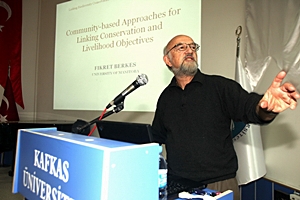World-Famous Ecology Professor Fikret Berkes Gave a Talk in Honor of 2010 International Year of Biodiversity
- Ayrıntılar
- Kategori: What is Nature?

Professor Dr. Fikret Berkes , who is a distinguished professor at Natural Resources Institute, University of Manitoba and his wife Doç. Dr. Mine Berkes came to Kars as guests of KuzeyDoğa Society and Doç. Dr. Çağan Şekercioğlu. Prof. Fikret Berkes is one of the most published Turkish environmental scientists has over 300 publications, including 9 books published in Turkey, USA, UK and Brazil. Although the Berkes couple was on vacation in Turkey, they came to Kars to support KuzeyDoga’s conservation efforts. On 14 May 2010, Prof. Berkes gave a talk on “The importance of involving local people in natural resource conservation” at Kafkas University as a guest of assistant professor Dr. Mehmet Ali Kırpık of Kafkas University Biology Department.
177 students and academicians came to the talk organized in honor of 2010 International Year of Biodiversity. Professor Berkes started his talk by mentioning the importance of local people participating in nature conservation. He stated that nature conservation projects which do not consider local people will often fail and such projects should provide local people benefits from nature conservation through sustainable initiatives such as nature-based tourism. He gave several examples from different projects conducted in different parts of the world, including the Equator Initiative. Berkes mentioned the importance of the “Nature Conservation, Research, Restoration and Nature Tourism” project of KuzeyDoğa Society at Lake Kuyucuk where he had visited the day before. He added that such projects need a lot of passionate and dedicated work. He was impressed that in the short time of 3 years, Lake Kuyucuk became Turkey’s 13th Ramsar site in 2009 and the European Destination of Excellence of 2009, while receiving the 2008 Whitley Gold Award, and having Turkey’s first artificial island constructed for bird conservation. He said that cooperation and collaboration are very important in such projects and he applauded KuzeyDoğa Society for closely working with the Kars Directorate of Forestry & Environment, Kars Governorship, Kars Municipality, district governorships, surrounding villages and their people. After his talk he answered questions on nature conservation and ecology for an hour. Then he thanked Kafkas University for providing such an opportunity. Professor Dr. Fikret Berkes and Doc. Dr. Mine Berkes went back to Istanbul on Saturday after they conducted a workshop at Lake Kuyucuk Sustainable Nature Tourism Training organized by KuzeyDoğa Society and HasNa Foundation.












